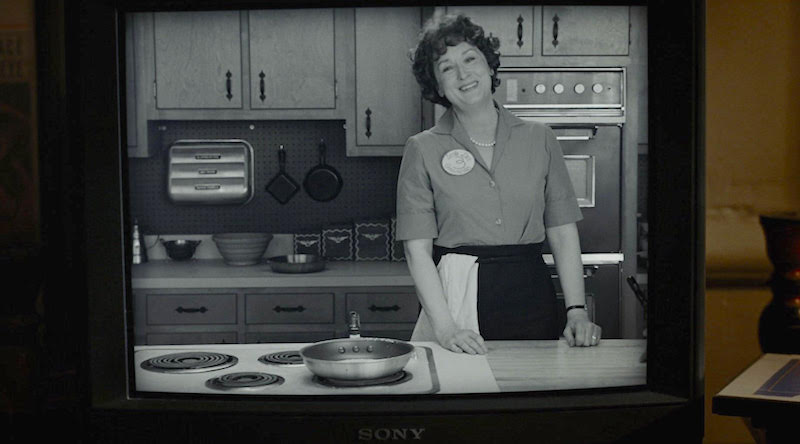
The Filmography: Across 52 films, Meryl Streep taught America how to act, and how to accept awards. It’s been 41 years since Ms. Streep’s first film. Today we might think we live in the world Jennifer Lawrence, Brie Larson, and Alicia Vikander made, but beneath it all is Meryl, 69 if she’s a day, and no one can touch her.
The Contenders: Too young to recall The Hours press tour, and much too young for any pre-Devil Wears Prada context, really, Matthew and John were looking for a challenge. And from Still of the Night to Dark Matter, they found it. Risking their sanity, their jobs, and Ingmar Bergman centennial retrospectives, they have signed on for a deranged assignment.
365 days. 52 films. A dozen-plus accents. Three Oscars. Two boys. One refurbished Blu-Ray player. How far will it go? We can only wait. And wait. And wait...
The Months of Meryl Project. Wrapping up soon on a blog you’re already reading.
#41 — Julia Child, beloved chef and unanticipated television star of singular personality.
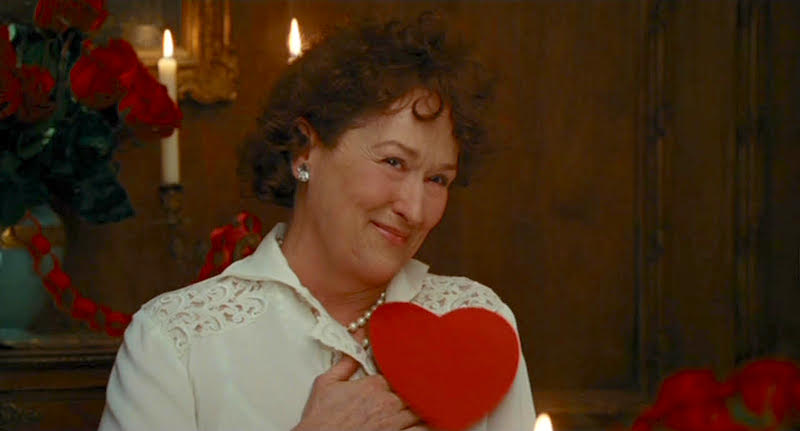
MATTHEW: In surveying all 21 of the films that constitute Meryl Streep’s history-making haul of Academy Award nominations, Nora Ephron’s Julie & Julia, to my mind, represents an acting challenge that only this stupendous performer could have possibly played and been rewarded for playing...
An adaptation of two memoirs about self-activating female discovery, Julia Child’s My Life in France (completed and published in 2006 by Alex Prud’homme after Child’s 2004 death) and Julie Powell’s eponymous blog-turned-2005 bestseller, Ephron’s cinematic swan song tells two true stories. One centers around the revered Child (Streep), trying to make a name for herself in the world of culinary arts as an American expat living in 1950s Paris. The other belongs to Powell, a would-be writer in post-9/11 New York City who decides to make all 524 recipes in Child’s influential, debut 1961 cookbook Mastering the Art of French Cooking over the course of a year, while simultaneously documenting her journey on the web. As Julie, Streep’s Doubt costar Amy Adams, for some reason saddled with Mary Badham’s haircut in To Kill a Mockingbird, is endearing if overly finicky while doing most of the heavy-lifting, dramatically speaking. Streep, on the other hand, is tasked with playing Powell’s idealized image of Julia Child as a faultless good fairy and a fount of near-boundless optimism in her own intertwined segment, which comes to focus on Child’s years-long struggle to write and publish that first tome.
What other actress could have taken on a persona as prone to imitation as Julia Child’s and ridden this role all the way to the Dolby Theatre, receiving hosannas from mainstream audiences and major critics’ groups along the way? Save for perhaps Angels in America’s Ethel Rosenberg, Streep had never before slipped into the life of a real human being quite so familiar, which is perhaps why she herself was somewhat ambivalent about classifying her performance as a direct imitation, to the extent of arguably diminishing her own efforts and achievements in the process. Streep told The Telegraph upon the film’s release:
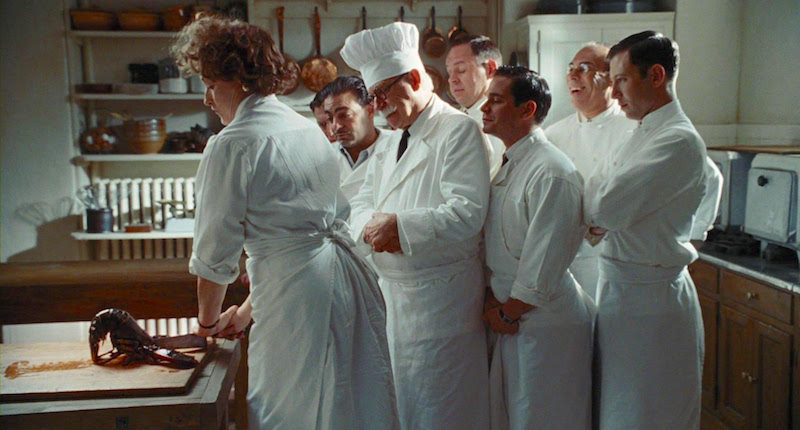
I’m playing Julia as Julie’s idea of what she was like, so I’m not really ‘doing’ Julia Child. While I felt a responsibility to her memory and the legacy of the work she did, I didn’t feel I was replicating her because I don’t presume to know what she was like. That’s my rationalisation, my ‘out,’ because I thought that even if I made a big, glaring mistake with her I’m really only a figment of someone else’s imagination.”
To my eye and ear, Streep’s deft, smart yet purposely limited performance nonetheless feels like an act of unmistakable and unadulterated mimicry, evident from the second the actress opens her mouth and lets forth that notoriously high-pitched voice with its fluty inflections, loopy vowels, and continent-hopping accent. Knowing that her half of the movie is a frothy yet deeply-felt divertissement, a nostalgic period distraction from Julie’s slowly alleviating and far more present drudgery, Streep keeps her touch light and hews closely to the Julia Child known and adored by millions, all the while taking lip-smacking pleasure in an assignment that necessitates a certain largesse of spirit. The performance is consequently ample in its affection (and affectation), but also able to function as a big-hearted valentine to all of the things that defined the films and writing of Streep’s dearly-departed pal Ephron, from her insatiable love of food to her belief in the soul-strengthening power of sisterhood to her staunch allegiance to intrepid, unapologetic, independent-minded women. Streep further used the character to show her appreciation of another woman particularly close to her heart, her late mother, the artist and homemaker Mary Wilkinson Streep, a choice she noted in an extremely poignant Golden Globes acceptance speech for the film. As Streep told The Telegraph:
[Julia Child] transformed cooking for regular people… even if my mother wasn’t a good cook, she had a similar joie de vivre and an undeniable sense of how to enjoy her life… [Julie & Julia] is my homage to her spirit.”
What do you make of what we might call Streep’s tripartite tribute of a performance?
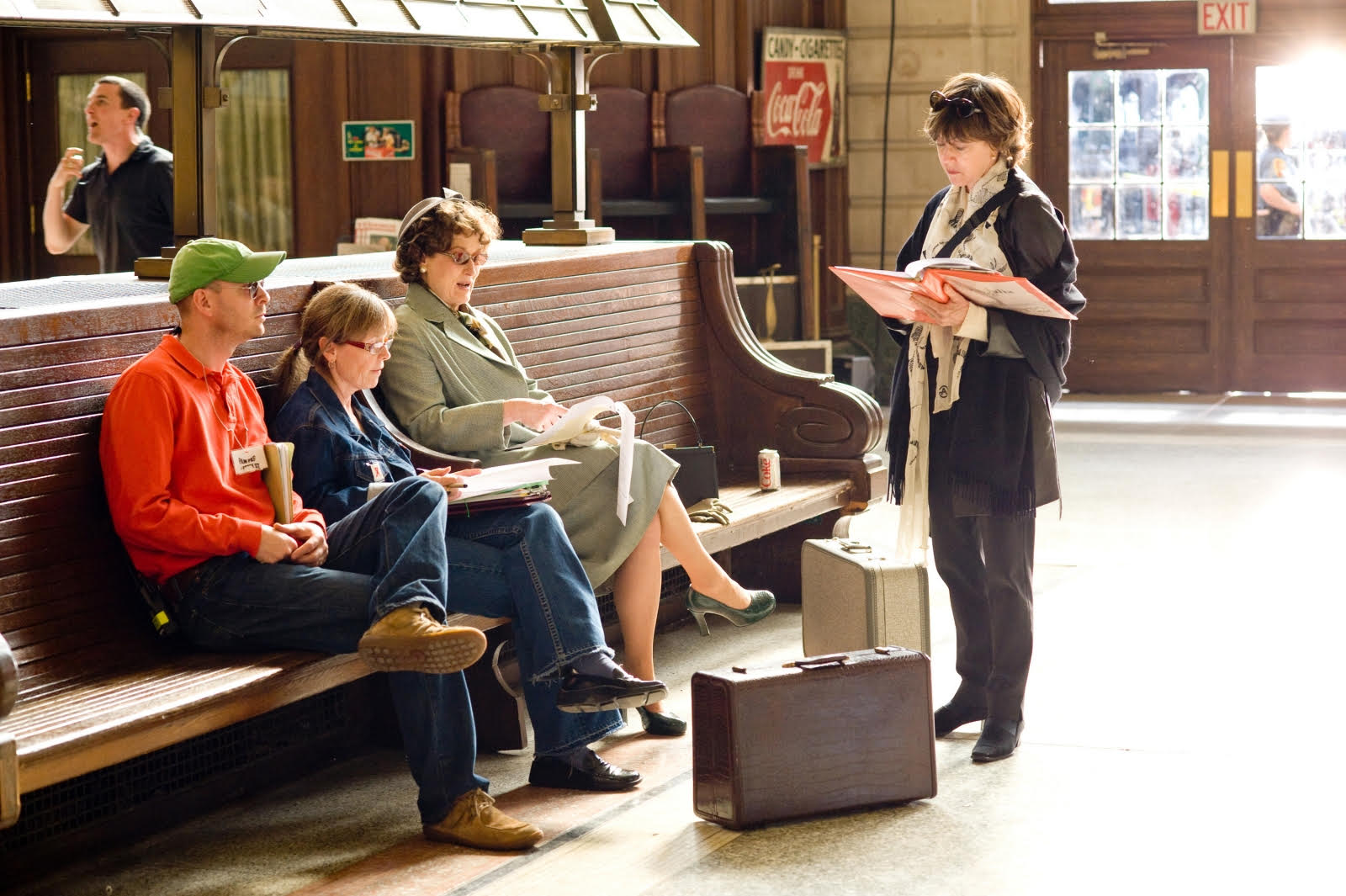 on the set
on the set
JOHN: Quadripartite? Is it possible to pay tribute to yourself? Well, it’s certainly possible if you’re Meryl Streep. Maybe I’m overly identifying myself with Julie Powell in noticing the parallels between Child’s pioneering work in cooking and Streep’s own strides in film acting. But Streep herself is clearly dipping into her own renewed audience popularity following a string of box office and/or critical hits over the past three years. Julie & Julia is as much a gift to Streep fans as it is to bloggers, foodies, and Child devotees, serving up an atypical biopic performance in which Streep actively eschews her penchant for precise and nuanced characterization, which has defined her previous screen incarnations of real-life women. Instead, Streep’s Julia Child is a figment of our cultural imagination, capturing more of the spirit than the specifics of this oft-parodied but much-loved culinary icon — which is just what the film calls for.
After twice watching Julie & Julia, it’s still hard to know what exactly made Child’s cooking as revolutionary as the film purports it to be; most of what we glimpse about Child’s actual cooking faculties are lampooned, and the difficult recipes she helped author seem better suited to professional chefs than the “typical” American housewife. Nevertheless, Streep ensures that we unmistakably understand Child’s essence, that outsized and indomitable nature, brought to a boil while pursuing this mid-life dream. Streep’s performance is almost campy, a conflagration of breathless vocal work, relaxed yet heightened physicality, and unembarrassed glee. Her verve is infectious: I guffawed at Julia leaping out of bed in the morning to shout, “I’m alive!” This spry naïveté, however, does not curb Child’s healthy sexual appetite; it’s incredibly refreshing to watch Streep, age 60, be this sexy and titillated on screen. And all she needs to do to deepen the genuine bond between Child and her husband Paul (Stanley Tucci) is flutter the heart on her dress across the table from him at a couples’ Valentine’s Day party.
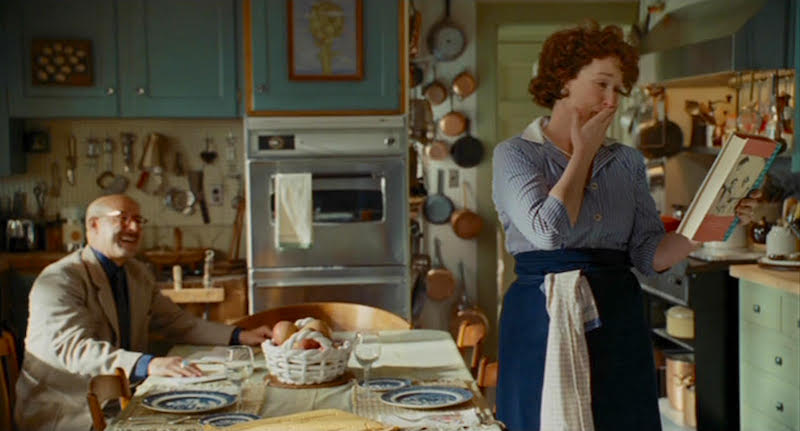
Is it possible, then, that this same woman would later rip Julie Powell’s reverential homespun project to near-shreds? Is this really the same woman from Pasadena who once worked as a secret agent? How do we square this harmless, people-pleasing ham with the celebrity who gave Streep the brush-off for daring to question her use of food pesticides in the late 1980s? Nothing about Streep’s performance hints at these other facets of Child. By abstaining from subtlety, Streep’s performance becomes rather static and, after a while, routine. As in Mamma Mia!, Streep is allowed here to be as free and unbuttoned as ever, throwing herself into the film with unbridled, exuberant energy. She remains undoubtedly exciting to watch, even if I wished for more variation and a surer directorial hand to reign in her impulses to go big and broad. Do you also wish that Streep had done more to dimensionalize her heroine, or would that be like trying to make duck à l’orange from a cheese soufflé?
MATTHEW: As Streep’s belly laughs and cooing, flighty asides ran the risk of repetition, I definitely found myself wanting to see more of the Julia Child who publicly called into question the seriousness of Julie Powell’s experiment and went so far as to paint her most popular enthusiast, via various sources, as something like a foolish, attention-hungry nonprofessional. But that’s not the Julia Child that Streep is playing nor the Julia Child that Julie & Julia is especially interested in portraying, aside from the brief, almost climactic mention of Child’s critique within the film. What Ephron has done instead is cull together the passages of Child’s pre-stardom life that most directly reflect Powell’s narrative in order to position the former as a bubbly beacon of determination for the latter to admire and echo. Therefore, that toothy, pink-cheeked smile remains plastered on Streep’s face, slipping only when Julia is confronted by disheartening reminders of her infertility or one of multiple, condescending adversaries, upon which she wears her opponent down into submission with the sheer, “I’ll show you” gumption of her oversized personality. In attempting to mirror a specific, widely-known model, Streep is always colorful without necessarily coloring outside the lines.
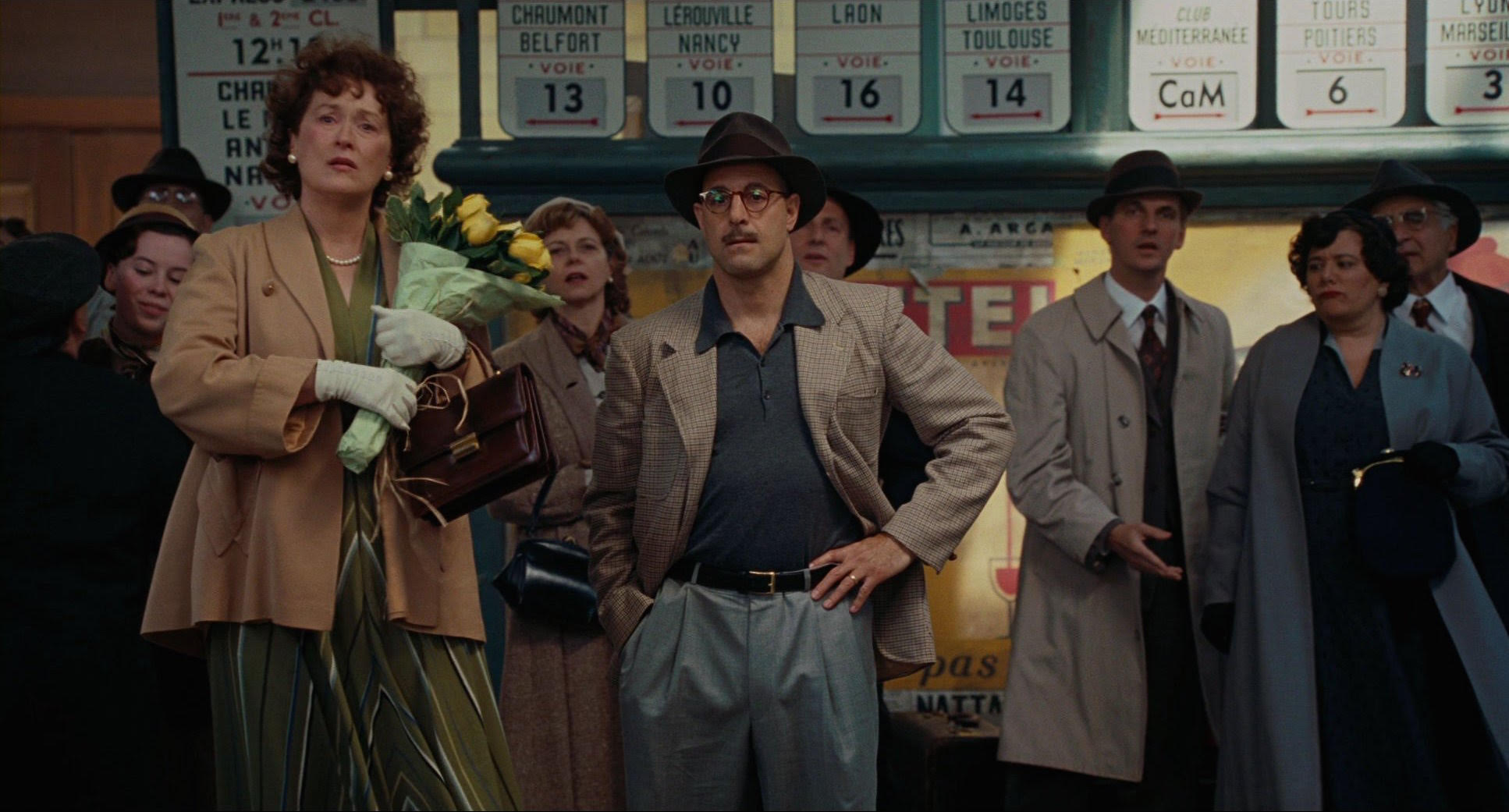
Luckily, there is plenty else to relish in Ephron’s film, and much of it has to do with Tucci, the rare scene partner of Streep’s who is confident enough in his own abilities to not just blindly follow the lead of this intimidating master. Tucci keeps Streep on her toes at all times by keeping his own readings and reactions beautifully loose and spontaneous. Without saying a word or doing anything more than tensing his gaze and taking a weary breath, Tucci offers the closest thing to a critical perspective of Julia, giving us tiny glimpses at the occasional exasperation of living with so eccentric and irrepressible a force of nature. The two maintain such a delicious and genuinely sexy chemistry, commingling the couple’s love of food with their famously healthy bedroom activity; just look at the way Streep sensually stares at Tucci as he tastes a forkful of her first meal in a Paris bistro, her uncontainable ecstasy at being able to share a dining experience with the one she loves and desires spreading over him and, inevitably, over us.
And despite the restraints placed on her character and thus her creativity, Streep is perfectly capable, as ever, of making our hearts flutter all on her own, whether her Julia is whooping with pride and joy at seeing the long-awaited fruition of her hard work or just carrying herself like the tall, twinkling candle that she was — flooding every space with light, unable to be extinguished.

Next Week: It's Complicated